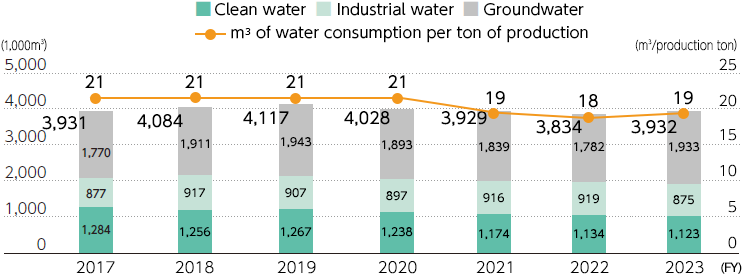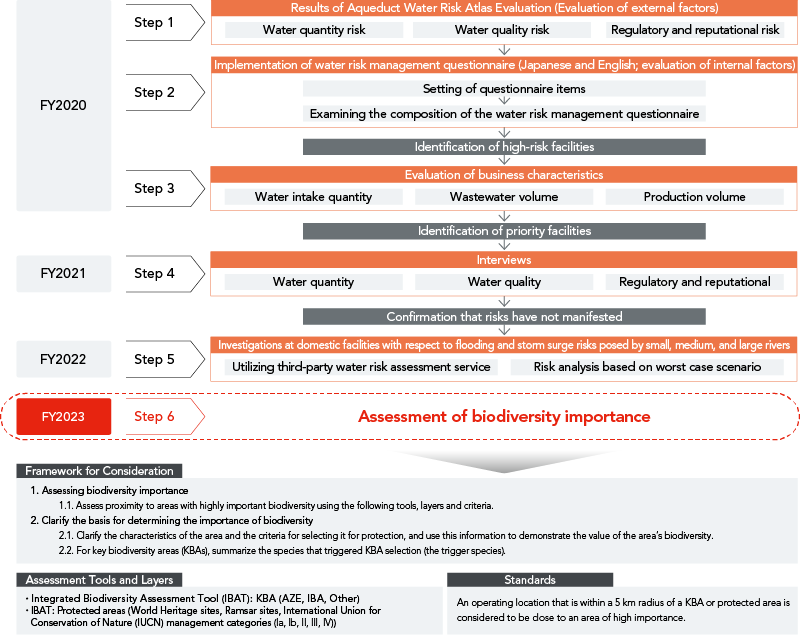As one factor in achieving its goal of building sustainable supply chains, the Nichirei Group recognizes the importance of water resources in producing raw materials and conducting business, and strives to conserve such resources. In addressing water risk, it is important to understand the local situation and the status of initiatives at our sites. As part of our water risk assessment, we use a third-party water risk assessment service to evaluate water risk at our locations. In addition to the WRI Aqueduct*, which assesses regional water risks, we conducted a questionnaire survey of all Group sites to ascertain the status of their initiatives. The water risk assessment was conducted for all Nichirei Group sites in Japan and overseas (152 sites), covering the WRI Aqueduct* assessment items of water quantity, water quality, and regulation/reputation. In FY2021, interviews were conducted at the three facilities identified as having high water risk, and the Group confirmed at that time that there were no water risks in terms of quantity, quality or regulatory and reputational risks. In FY2022, investigations were conducted at facilities in Japan with respect to river flooding and storm surge risk due to typhoons and heavy rains.
Regarding water resources used in business, the volumes of water used and wastewater discharged at worksites in Japan are disclosed externally on the ESG quantitative data. These data are reported to the Group Sustainability Committee, whose members are members of management.
Forest conservation activities leading to the preservation of water resources are publicized internally and externally via the Group’s website and intranet. Nichirei Foods has been conducting its own "Hamidasu Activities" to conserve forests and contribute to local communities at its production plants nationwide. designed to raise employee awareness for the environment.
As one factor in achieving its goal of building sustainable supply chains, the Nichirei Group recognizes the importance of water resources in producing raw materials and conducting business, and strives to conserve such resources.
In terms of water-related initiatives associated with business activities, in addition to water-saving efforts at its food factories and distribution centers, the Group is raising employee awareness such as by displaying posters. At worksites in Japan, the Group keeps track and manages consumption of water and quality of wastewater through regular monitoring in compliance with various laws and regulations.
We have set reduction targets for each site and are working to reduce water throughout the Group.
●Water Usage (By water intake source)

From FY2020 through FY2022, the Group conducted water risk assessments at all of its facilities (152 facilities in Japan and overseas) and identified facilities where water risk was high as a result of internal and external factors. In FY2021, interviews were conducted at the three facilities identified as having high water risk, and the Group confirmed at that time that there were no water risks in terms of quantity, quality or regulatory and reputational risks. In FY2022, investigations were conducted at facilities in Japan with respect to river flooding and storm surge risk due to typhoons and heavy rains.
In FY2023, we evaluated whether the 133 facilities in Japan that the Nichirei Group directly operates are located close to areas that are of high importance in terms of biodiversity, and concurrently clarified the basis for determining biodiversity importance for considering the direction of future business activities at those facilities.
●Assessment Process

< Assessment Results >
Approximately 89% of all Group operating facilities in Japan were adjacent to areas of high importance in terms of biodiversity. This is likely due to the nature of our business since we extensively operate in coastal areas. We will analyze the results in detail and conduct a fact-finding survey through on-site visits. Regarding our overseas facilities, we will also consider the Group’s impact on biodiversity and relevant countermeasures.